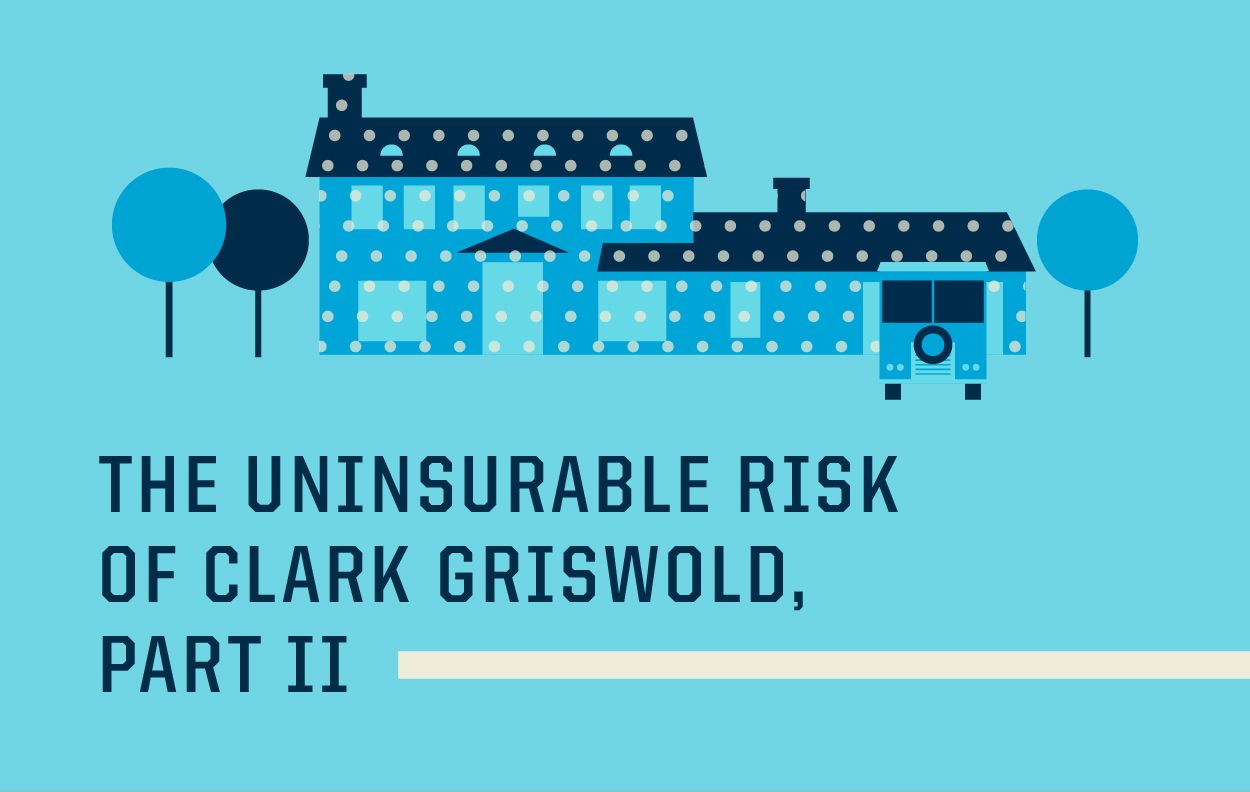The Uninsurable Risk of Clark Griswold: Part II

A few years ago, we shared a post titled, The Uninsurable Risk of Clark Griswold. Much like the classic film itself, that post has remained a seasonal favorite amongst our blog readership. Today we’re taking it one step further (with some help from Rich Nouza, Liability Large Loss Consultant) to break down some of National Lampoon’s Christmas Vacation’s most iconic scenes as we explore the liability risks* and insurance implications of hosting the hap-hap-happiest Christmas since…well, you know.
In the film, Clark’s cousin Eddie rolls into town in an RV he allegedly “borrowed off a buddy.” Throughout the film the “good-looking vehicle” makes a number of appearances, including the infamous sewer scene.
What’s the liability of loaning someone your RV?
Presuming coverage is similar to a personal auto, insurance would follow the RV. The person driving would be a permissive user and entitled to coverage under the RV policy. As such, the insured would have liability and coverage as per the policy.
Is there any difference between the liability of having guests inside your RV versus inside a home?
Yes. In a premises liability situation with a home, the homeowner has certain duties to warn guests of known dangers, etc. Presuming an RV is akin to a personal auto, those duties are not the same as they would be for a homeowner.
In addition to the RV, Eddie brings along his entire family, including their beloved dog, Snots. Later in the film, Aunt Bethany shows up with her mistakenly-wrapped cat, introducing two furry characters into an already chaotic Christmas.
When a guest visits and brings a pet, how does that impact the homeowner’s liability? If that animal should injure someone in the home, who bears the burden of that liability?
There would arise a legal question as to who is the “harborer or keeper” of the pet. If the guest is present with their pet, then liability stays with the owner. If the pet owner leaves the premises and the pet is in the care, custody or control of the insured, then liability could transfer to the insured. There could also be some additional liability on the homeowner if they knew of any violent propensities of the pet (i.e. prior bites or aggressiveness) and did not warn other guests, even if the pet owner remains present. Med Pay would also be available.
Early in the film, it is revealed that Clark has plans to use his Christmas bonus to install an in-ground pool. Unbeknownst to his family, the plan is to reveal the surprise swimming pool plan on Christmas Eve.
How does a pool impact liability as a homeowner?
The same kind of premises liability analysis would be conducted with respect to any claims related to a pool. Pools are oftentimes referred to as an “attractive nuisance,” such that small children wander to them, which is why fencing, alarms, etc. are recommended to safeguard from those potential exposures.
Like any true holiday gathering, food plays a pivotal role through the film. In addition to a Jell-O mould decorated with cat food and several moosehead mugs full of unrefrigerated eggnog, one of the most iconic scenes is Christmas dinner gone awry during which the extremely overcooked turkey unfurls in front of a table full of hungry dinner guests.
Can a host be held liable if they accidentally give their guests food poisoning?
The answer is likely “maybe” depending on the situation and whether the food poisoning would meet the definition of an “occurrence.” We would have to run the negligence test of duties owed, duties breached, cause and damage to determine liability.
After a disappointing Christmas bonus arrives in the form of a subscription to the Jelly of the Month Club, Clark goes on an iconic tirade about his boss. A well-intentioned (albeit highly misguided) Cousin Eddie takes it upon himself to kidnap Clark’s boss, bringing him back to the Griswold house so Clark can give him a piece of his mind. Shortly thereafter, the family is surprised by a SWAT team bursting through all their doors and windows.
If SWAT raids your house (smashing windows, doors, etc.), are those damages covered?
The type of damage is likely not covered, as most homeowner policies contain an exclusion for damages caused by governmental action. The government has sovereign immunity, and would not pay for those damages. An exception to this exclusion is with respect to fire department damage caused during the course of fighting a fire.
It might be easy to assume these kinds of wild scenarios are limited to the theatrics of Hollywood, but we’ve been known to hear a memorable story or two passing through the halls of Central. Here are a couple from our Claims Department:
“I had a claim for a policyholder who walked into a neighbor’s home with a handful of bottle rockets on New Year’s Eve. Somehow, he accidentally lit them causing approximately $50,000 in damages to the home’s interior and contents.”
-Tommy Brack, SERO Regional Claims Manager
“[Not unlike Clark Griswold] a plaintiff fell through the attic, then sued the homebuilder. Unfortunately, the plaintiff sustained some serious injuries, but we prevailed on summary judgment.”
-Jeremy McMichen, Southeast Regional Office Liability Claim Supervisor
However you celebrate the season, we hope your holidays are safe, healthy and happy.
*The information above is of a general nature and your policy and coverages provided may differ from the examples provided. Please read your policy in its entirety to determine your actual coverage available.
Like this:
Loading…







